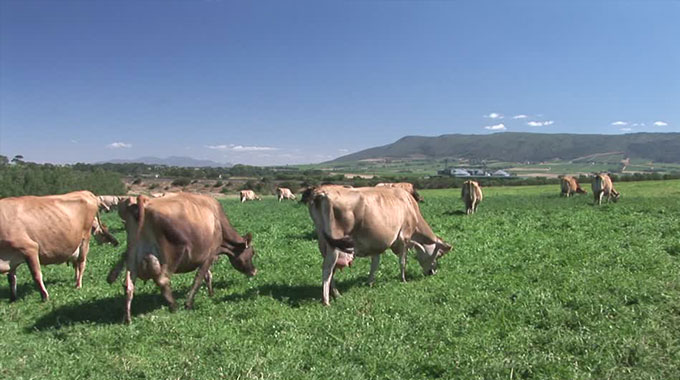
Sukulwenkosi Dube-Matutu, Gwanda Correspondent
THE Department of Livestock in Matabeleland South Province has started hay baling to supply livestock farmers with feed at an affordable cost in order to reduce animal deaths this year.
Last year the province lost more than 26 000 head of cattle to poverty deaths between June and early December. Most areas in the province have poor pastures as a result of low rains that were received during the last rainy season.
In an interview, Matabeleland South Acting Provincial Agricultural Officer, Mr Mkhunjulelwa Ndlovu said they had put in place strategies to reduce the number of livestock deaths.
He said the most affected area is Beitbridge followed by Gwanda South, Matobo, Mangwe, Bulilima West and Insiza South.
“Last year we lost over 26 000 cattle but the number can be around 30 000 because farmers don’t report everything. If the situation is not addressed, we can record an increase this year and we could start recording deaths early. We thought 2020 would be a better year but it’s challenging as the grazing didn’t establish well in most areas in the province,” he said.
“As part of mitigatory strategies we have started hay cutting. We have identified Shangani area which is in Insiza North which is an area where there are a lot of grasslands and from there we will move to another area. We are already cutting hay and baling. A team is on the ground as we speak. Our aim is to bale as much as we can then distribute it to areas where it’s critical. It will be sold on a cost recovery basis as we want to urge farmers to be business minded. Our prayer is that people don’t burn down grass. Our target is to collect over 100 000 bales if we can get grass lands because we really need biomass for our livestock.”
Mr Ndlovu said they were also in the process of engaging other partners who are into feed formulation. “We have since talked to United Refineries who are into oil processing using soya bean, that soya bean mixture is very rich in protein which is the nutrient that we want in order to sustain our livestock. We want to link farmers with companies that supply commercial feed,” he said.
“Once the companies agree with the farmers, they can establish selling points in those areas. Some of these companies are capable of producing tonnes and tonnes of feed which can be mixed with hay to assist in terms of digestion and protein supplement.”
Mr Ndlovu said farmers who are into irrigation farming have been urged to put a bit of land under high yielding fodder grass or fodder crops to supplement for small stock like goats and lactating animals.
He encouraged farmers to start reconditioning their animals immediately before their condition worsened.
Mr Ndlovu said water supply for animals remains a challenge as most poverty deaths were a result of water shortages. He said communities had to be actively involved in repairing boreholes while partners could assist in drilling deep boreholes to save livestock.
“Our target this year is for farmers to think in terms of resilience. Those with bigger arable lands should fence them and have a certain area where they can plant fodder. They should be reliable and self-sustaining as gone are the days of relying on the donor community especially during this Covid-19 period,” he said. — @DubeMatutu.
